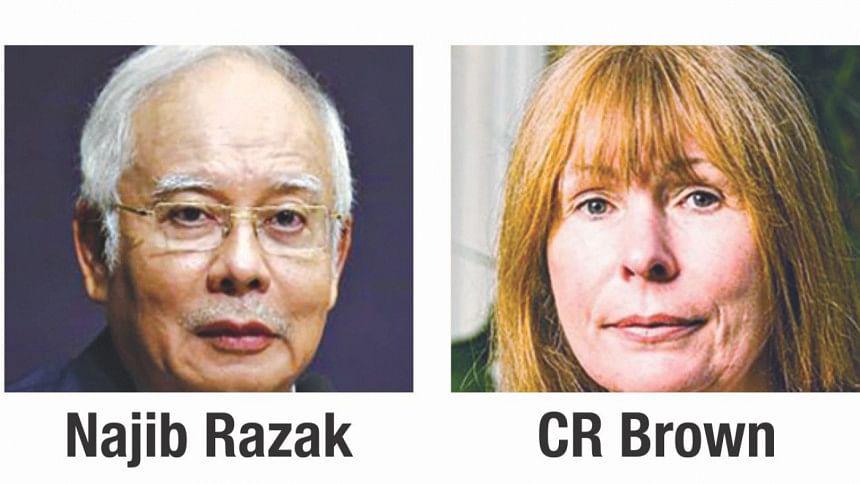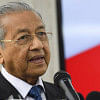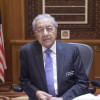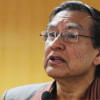A win for free media

She was labelled as “the enemy of state” much in the style of Ibsen's famous play “An Enemy of the People” by the Malaysian government, which notified Interpol in 2015 that it had charged the woman in question with disseminating false documents and partaking in “activities detrimental to parliamentary democracy” -- a charge that entails 25 years in prison.
Four years down the line, with the arrest of former Malaysian prime minister Najib Razak and framing of corruption charges against him, she comes out as the champion of truth, who unveiled the world's biggest financial scam to date.
She is Clare Rewcastle Brown, a journalist, who once worked for the BBC. She unveiled the biggest financial scam of our time involving about $4.5 billion on her news site, working from her tiny kitchen in central London.
Her hitherto little-known website where she first published the story in 2015 of how Najib, his son and some other persons in collusion cheated the Malaysian people to set up a government-owned fund for development projects named 1MDB, but in reality took out the money for their own benefit, lived a lavish life, transferred money to their accounts, invested in Hollywood movies, bought Monet paintings and dined at places that cost upwards of $500 a person.
Clare's exposé imperilled her life. She was wanted by the police in Malaysia, the country she thought to be hers as her birth place while her British father worked there as a colonial police officer under the British regime.
She was advised not to visit Singapore. She had curbed her movement and was escorted by police even when she took a stroll on a park in London.
Yet, she did not buckle and showed to the world the priceless value of free and independent media. She once again proved to the world how crucial the media's role is in upholding democracy, exposing corruption and protecting people's money from being usurped.
Her story also shows how precarious the work of a journalist can be, and how dedication to the profession can benefit a journalist with a world scoop.
Najib was ruthless in suppressing the scam and typical of any corrupt government in dismissing the controversy as a “politically motivated” anti-Najib campaign.
Claire was labelled as unprofessional who they claimed was working for Najib's opponents.
Najib sacked senior government officials who raised questions about the fund, his deputy prime minister and the then attorney general got the axe for showing interest in the allegations.
He quashed an investigation into the scandal when it exploded three years ago. His government also suspended the licence of a newspaper that had led reporting on the case and detained scores of critics.
But, as Claire said, she “simply followed the story”.
Her work also teaches us quite a few things about how to build sources, how an alert journalist can smell news at a dinner as she did from an unrelated person, and how a true journalist should follow the trail to the jackpot.
At the dinner, she just heard rumours about an extraordinary corruption. Curious, she started scouting around for someone who had better information and found out a source who showed her some screen grabs of documents of a company through which the 1MDB funds were siphoned off.
It seemed a disgruntled official of the company had all the documents and wanted to sell them for $2 million, an amount beyond Clare's ability.
But with her patient scouring, she found a publisher willing to pay for the documents and then she had the bombshell in hand that ultimately unravelled the biggest financial scam of the world.
Clare's case also highlights why a society should fight for its free press that would work as a watchdog on the society.
Clare's breed, though rare, is not uncommon in the world of journalism. The history of journalism shows how brave, intelligent and truth-seeking journalists have, from time to time, run exposes which revealed the political and financial wrongdoings that otherwise would have gone unheeded.
Take Iraq as an example. It was BBC journalist Andrew Gilligan who had first exposed that Tony Blair's famous “45-minute to doom” dossier, which falsely claimed that Saddam Hossain possessed weapons of mass destruction, was actually a lie.
His report, aired on BBC Tonight, showed that Blair and George W Bush weaved together to attack Iraq just to grab its oil.
The report brought so much of pressure on the BBC and its journalist that Gilligan and the BBC chairman resigned but did not retract the report.
Blair and his troop came down heavily on the BBC and its reporter even in parliament. But in the long run, the BBC was proved right and Blair had to pay the price dearly down the line as he had to resign in the face of dwindling support within his own party.
Then there was this very little-known Lebanese journalist who leaked out the story of Iran-Contra scandal.
The US secretly sold arms to Iran, defying its own sanctions during the Iran-Iraq war and channelled the money to the US-backed Contra rebels in Nicaragua who were fighting the socialist government of the Latin-American country.
The Lebanese journalist's exposé took the air out of the American high ground on the First Gulf War as the Iran-Iraq conflict is dubbed. It revealed the double face of the US government.
And of course we can recall the famous Watergate scandal revealed by two Washington Post reporters Bob Woodward and Carl Bernstein who exposed how president Richard Nixon's election campaigners had the Democrat office burgled to steal documents and wiretap the office for eavesdropping.
Nixon tried to cover up the incident in a high-handed manner but finally he had to resign. The exposé had changed American politics forever.
And of late, we know about the exposés called The Paradise Papers and the Panama Papers.
The Paradise Papers, a special investigation by 96 media partners worldwide into a leak of 13.4 million files from two offshore service providers and the company registries of 19 tax havens, threw light on how politicians, multinationals, celebrities and high-net-worth individuals use complex structures to protect their cash from higher taxes.
The Panama Papers leak is also a huge compilation of documents obtained by German newspaper Süddeutsche Zeitung, which called in the International Consortium of Investigative Journalists (ICIJ) to oversee the investigation. It also revealed the shoddy moral sides of the rich and powerful to hide wealth and evade tax.
Or we can think of the South African press exposing how Jacob Zuma plundered the country by illegally giving big contracts to the members of an Indian-born Gupta family.
The Guptas became so powerful that they even made decisions as to who would become ministers in Zuma's cabinet. Because of the continuous trident of the media, Zuma had to resign this year and faces 16 charges of corruption.
The history of great journalism is replete with such bright examples of the media protecting the public interest from the whims of the powerful.
We can recall Seymour Hersh's exposé of the My Lai massacre in Vietnam that changed the American public sentiment towards the Vietnam War.
We can recall the exposé on National Security Agency's surveillance on citizens, and the end of US senator Joe McCarthy's communist witch-hunt because of reports in the Washington Post.
Or for that matter, consider the latest exposure of Hollywood's media mogul Harvey Weinstein in the New York Times for which he is now standing trial.
All this and more today stand as a glaring testimony of how important the media is to protect democracy, to stop wrongdoings and to bring justice to the powerless.
Today, the sordid tale of Najib is also a reflection of the fact that corruption can sprout in the absence of a free media.
Mahathir Mohammad, an autocrat who led Malaysia from 1981 to 2003, kept the media under the strong grip of the government, choking free journalism.
His successor Najib only tightened the control with passing of laws that would hand down harsh punishment to journalists for publishing “fake news” -- Clare's exposé on 1MDB was also accused by Najib of being fake -- and so the media was averse to unveiling the wrongs. So in the absence of the media vigil, this whole 1MDB scam took place, unnoticed and unreported.
It is because of such crucial role that the media plays in upholding democracy that Thomas Jefferson, one of the Founding Fathers of the USA, said: “Were it left to me to decide whether we should have a government without newspapers or newspapers without a government, I should not hesitate a moment to prefer the latter.”
We hail the independent media once again.

 For all latest news, follow The Daily Star's Google News channel.
For all latest news, follow The Daily Star's Google News channel. 







Comments